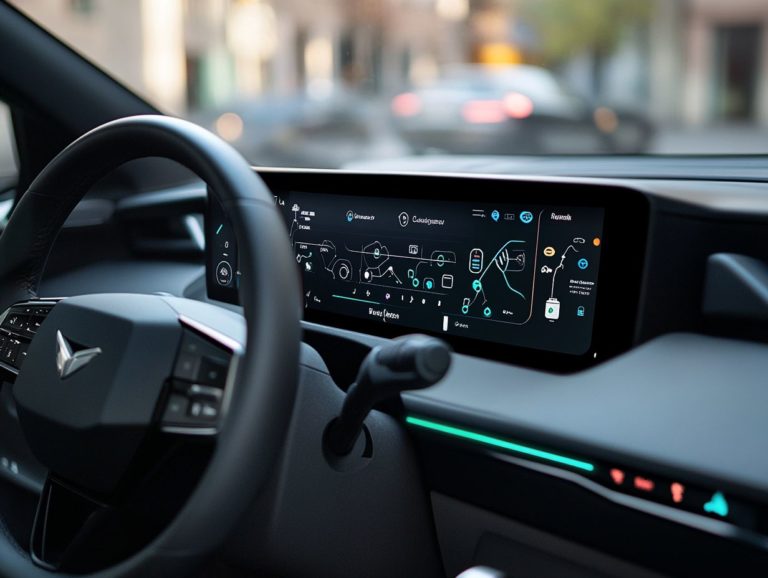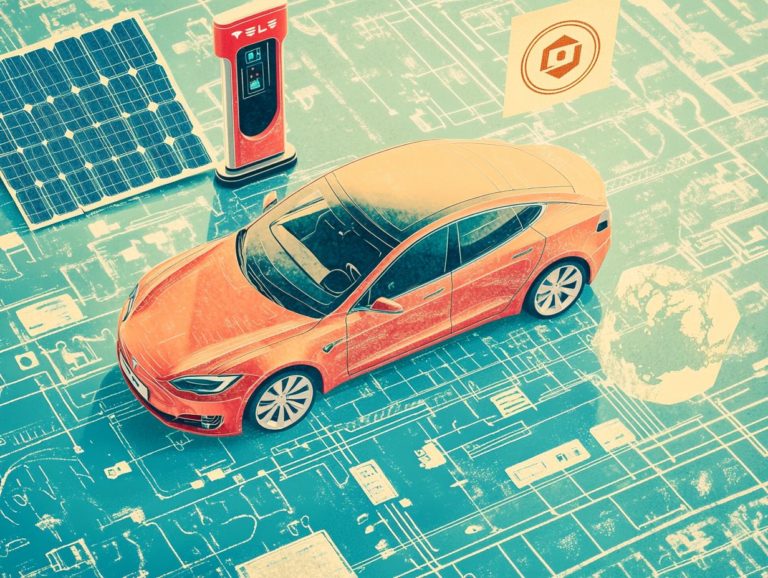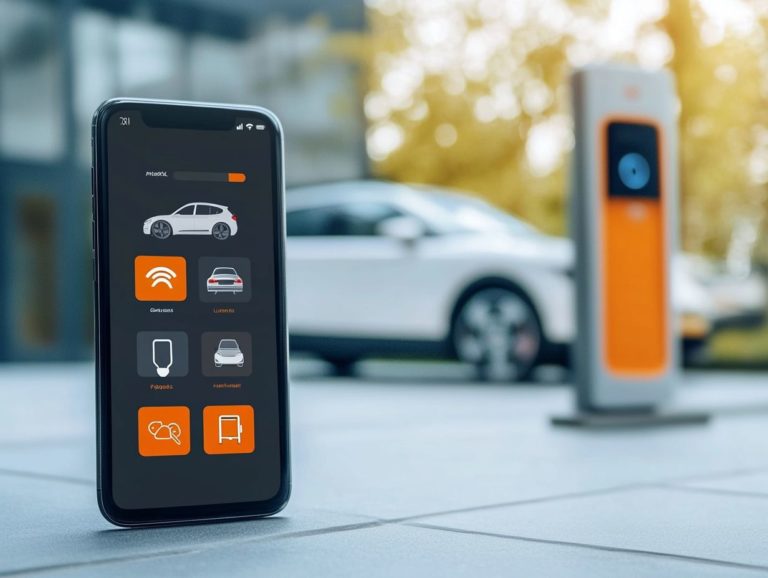How to Understand EV Tax Rebates
Electric vehicle (EV) tax rebates are gaining traction as more people choose eco-friendly options while saving money.
This article explains what EV tax rebates are, who qualifies, and the many benefits they offer. We provide a step-by-step guide for claiming these rebates and clarify common misconceptions.
If you’re thinking about buying an EV or want to increase your savings, this guide gives you the essential information you need.
Contents
Key Takeaways:

- EV tax rebates are financial incentives from the government to promote eco-friendly transportation.
- To qualify for these rebates, you must meet specific requirements set by the government.
- Claiming these rebates can lead to significant savings, making EVs more affordable over time.
What are EV Tax Rebates?
EV tax rebates are financial incentives provided by the federal government to encourage the adoption of electric vehicles. These rebates aim to help you transition to cleaner transportation options.
The Biden administration focuses on sustainability, making these rebates part of a broader strategy in the Inflation Reduction Act. They seek to reduce the environmental impact of transportation and stimulate the economy.
By offering up to $7,500 for qualified EV purchases, the program strives to make EVs more accessible, contributing to a cleaner future.
These rebates reduce the upfront costs of buying an EV. They show the government’s commitment to fighting climate change and promoting renewable energy.
The initiative supports national goals to decrease greenhouse gas emissions. By motivating you to shift from gasoline cars to electric vehicles, it helps make a significant impact.
This exciting move aligns with environmental policies that value sustainable development and energy efficiency. EVs are a great choice for eco-conscious consumers and shape the future of transportation.
Eligibility for EV Tax Rebates
To qualify for EV tax rebates, you must meet key requirements outlined by the federal EV tax credit program. These include income limits and the type of vehicle you buy.
Understanding these criteria is vital for anyone eager to seize the financial benefits of purchasing an electric vehicle.
Requirements and Qualifications
To qualify, you must meet specific IRS requirements, including Modified Adjusted Gross Income (MAGI) limits and purchasing qualified electric vehicles that meet certain standards.
These qualifications are crucial for anyone looking to maximize their tax credits while following federal rules. Understanding these requirements can affect the financial benefits you ll receive during tax season.
Beyond MAGI limits, be aware of which types of electric vehicles qualify under current IRS guidelines. These vehicles typically need to meet certain battery capacity and emissions standards to be eligible for rebates.
Stay informed about any changes in the electric vehicle market and tax benefits to make the best decisions for your financial future.
Explore EV options today to take advantage of these rebates and contribute to a healthier planet!
Benefits of EV Tax Rebates

The advantages of EV tax rebates go far beyond immediate financial savings. They present you with various incentives designed to encourage the adoption of electric vehicles while contributing to a cleaner environment.
These rebates can substantially lower the upfront cost of purchasing qualified electric vehicles, making them more accessible to a wider range of consumers. They also align with federal goals focused on reducing greenhouse gas emissions and promoting sustainable transportation solutions.
Financial Incentives and Savings
Financial incentives, such as EV tax rebates, can lead to substantial savings for you, often totaling $7,500 on qualifying electric vehicle purchases. These savings not only lower your ownership costs but also encourage you to explore a wider array of electric vehicles.
Understanding the financial implications of these incentives enables you to make informed decisions and enhances your investment in clean transportation.
These rebates play a crucial role in shaping the market landscape, enticing even those who might have been hesitant to move away from traditional gasoline vehicles. As more consumers take advantage of these tax credits, you help drive demand for EVs, leading to reduced prices and greater availability.
With lower initial costs, you may find yourself more inclined to embrace innovative technologies and sustainable options. This creates a positive feedback loop that boosts your finances while protecting our planet!
This shift aligns your personal values with eco-conscious living and nurtures a healthier marketplace marked by increasing competition and a broader selection of choices.
How to Claim EV Tax Rebates
Claiming EV tax rebates demands a step-by-step approach, starting with the completion of IRS Form 8936, the form used for electric vehicle tax credits. This form details essential information about your electric vehicle purchase and its eligibility within federal guidelines.
Following this process helps you file your tax credits accurately while meeting all IRS requirements. Understanding each step is vital for maximizing the benefits linked to EV tax rebates.
Step-by-Step Process
The step-by-step journey to claiming EV tax rebates entails several key actions you must follow to ensure your claims are both successful and compliant with IRS guidelines. Typically, these steps involve gathering required documents, completing IRS Form 8936, and submitting the necessary information with your tax return.
- Collect documentation, such as proof of purchase and vehicle eligibility, to substantiate your rebate claims.
- Next, it s vital to complete IRS Form 8936 accurately. This form captures essential information about your electric vehicle and outlines how to calculate the rebate amount.
- After you ve filled out the form, ensure it s filed with your annual tax return, along with any additional required information.
Staying organized and closely adhering to IRS requirements will streamline the process, ultimately leading you to a successful rebate claim. Don t wait check your eligibility today!
Common Misconceptions about EV Tax Rebates

Common misconceptions about EV tax rebates can create confusion for you as a buyer, often hindering your ability to fully benefit from the advantages of purchasing electric vehicles. You might mistakenly think that tax credits aren’t available or that your income could disqualify you, causing you to miss out on crucial information that could enhance your understanding of these incentives.
It’s essential to address these myths to boost awareness and encourage greater participation in the EV rebate program.
Dispelling Myths and Clarifying Facts
Dispelling myths about EV tax rebates is crucial for your awareness. This knowledge enables you to make informed decisions about purchasing electric vehicles. You might encounter misconceptions regarding eligibility, benefits, or the application process, making it essential to clarify these facts so you can fully capitalize on the available incentives.
Misunderstandings often arise from outdated information. For instance, you might think that only affluent individuals benefit from these tax rebates, but many programs are actually designed to assist a diverse range of income levels.
There may also be confusion about the specific requirements for qualifying vehicles or the steps necessary to claim these rebates. Addressing these myths helps you navigate EV benefits more easily, ultimately leading to more informed choices that support your journey toward sustainable transportation.
Frequently Asked Questions
What are EV tax rebates?
EV tax rebates are incentives offered by the government to encourage the purchase and use of electric vehicles. To understand how these work, it’s helpful to explore understanding EV incentives by state. These rebates usually come in the form of tax credits, which can reduce the amount of taxes you owe or even result in a tax refund.
Who is eligible for EV tax rebates?

The eligibility criteria for EV tax rebates vary depending on the country or state you live in. Generally, individuals who purchase or lease a new electric vehicle, as well as businesses that add electric vehicles to their fleet, are eligible for these rebates.
How much can I save with EV tax rebates?
Ready to save? The amount you can save with EV tax rebates also varies depending on your location and the specific tax credits offered. In some cases, you may be able to save thousands of dollars on your taxes. It’s important to research and understand the available rebates in your area.
What types of electric vehicles are eligible for tax rebates?
Most countries and states have specific eligibility requirements for electric vehicles to qualify for tax rebates. Generally, all-electric vehicles and plug-in hybrids are eligible. However, some may have restrictions on the make, model, or battery size of the vehicle.
How do I claim my EV tax rebates?
The process for claiming EV tax rebates also varies depending on your location. In most cases, you will need to fill out an application and provide proof of purchase or lease of an eligible electric vehicle. Some countries or states may also require additional documentation.
Are there any deadlines for claiming EV tax rebates?
Yes, there may be deadlines for claiming EV tax rebates, so it’s important to research and understand the specific timeline in your area. In some cases, you may need to claim your rebate within a certain time frame after purchasing or leasing an electric vehicle to be eligible. Check with your local government for the latest updates!






